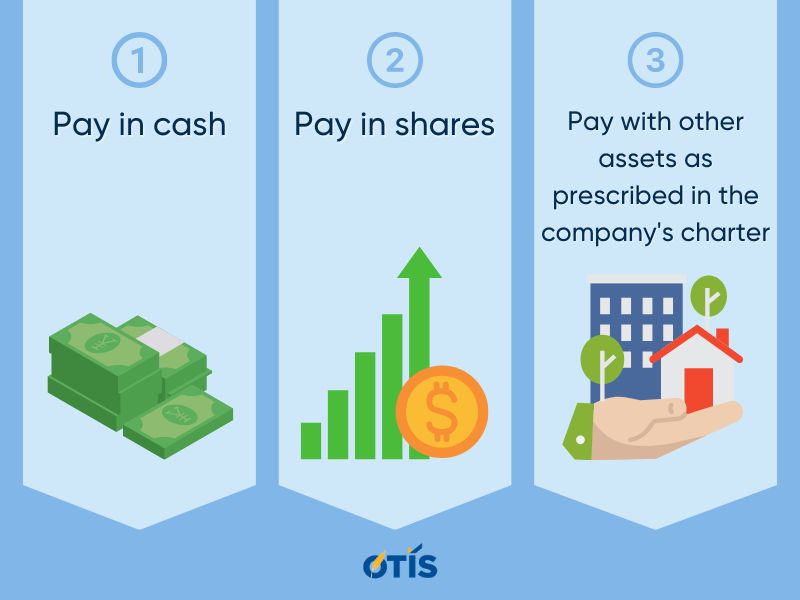Shareholders who contribute capital to a joint-stock company are entitled to a share of net profits called dividends. So how does the current corporate law regulate dividends? How are dividends paid to shareholders? OTIS LAWYERS will clarify with you in the article below!
Legal grounds
Enterprise Law 2020, amended and supplemented 2022
What are dividends?
Clause 5, Article 4 of the Enterprise Law 2020 defines dividends as follows: Dividend is understood as the net profit paid for each share in cash or other assets from the remaining profit of a joint stock company, after the financial obligations have been fulfilled.

Dividend Classification
Preferred stock dividends
Preference shares are shares that pay dividends at a higher rate than the dividend of common stock or a stable annual rate. Dividends distributed annually include fixed dividends and bonus dividends. Fixed dividends do not depend on the business results of the company.
The specific fixed dividend level and the method of determining bonus dividends are specified in the shares of dividend preference shares (according to Clause 1, Article 117 of the Enterprise Law 2020).
Dividends of ordinary shares
Common stock dividends are dividends paid to shareholders who own common shares. Pursuant to Clause 2, Article 135 of the Enterprise Law 2020, dividends paid for ordinary shares are determined based on the net profit realized and the dividend payment deducted from the company’s retained earnings.
Conditions for paying dividends
– Dividends paid for preferred shares shall be made according to the conditions applicable to each type of preference shares separately.
– Dividends paid for ordinary shares are determined based on the net profit realized and the dividend payment deducted from the company’s retained earnings. A joint-stock company may only pay dividends of ordinary shares when the following conditions are satisfied:
+ The company has fulfilled its tax obligations and other financial obligations as prescribed by law;
+ Having set up company funds and offset previous losses in accordance with the law and the company’s charter;
+ Immediately after paying off the CT, the company still ensures to pay all due debts and other property obligations.
In what form are dividends paid?

Pay in cash
If payment is made in cash, it must be made in Vietnam Dong and may be paid by check, wire transfer or money order sent by post to the permanent address or contact address of the shareholder.
Pay in shares
When the company needs to retain profits for investment and development, they can use authorized shares or treasury shares (if any) to pay dividends. The dividend per share under this payment method is the share in lieu of money.
In case of payment of dividends in shares, the company is not required to carry out the procedures for offering shares as prescribed in Articles 123, 124 and 125 of the Enterprise Law 2020. The company must register for an increase in charter capital corresponding to total par value of shares used to pay dividends within 10 days from the date of completion of dividend payment.
Pay with other assets as prescribed in the company’s charter
Depending on each enterprise, this form will be prescribed in the company’s charter.
How are dividends paid?
Clause 4, Article 135 of the Enterprise Law 2020 stipulates the method of paying dividends as follows:
dividends must be paid in full within 6 months from the end of the Annual General Meeting of Shareholders.
The Board of Directors shall make a list of shareholders who are entitled to receive dividends, determine the level of dividends to be paid for each share, the time limit and form of payment at least 30 days before each dividend payment. Notice of dividend payment shall be sent by a secure method to shareholders at the address registered in the register of shareholders at least 15 days before the payment of dividends.
The notice must include the following:
- a) The name of the company and the address of the head office of the company;
- b) Full name, contact address, nationality, number of legal papers of the individual, for individual shareholders;
- c) Name, enterprise code or number of legal papers of the organization, head office address, for shareholders being organizations;
- d) Number of shares of each type of shareholder; the level of dividends for each share and the total number of dividends received by such shareholder;
- dd) Time and method of paying dividends;
- e) Full name and signature of the Chairman of the Board of Directors and the legal representative of the company.
Note: In case a shareholder transfers his/her shares during the period between the end of the list of shareholders and the time of dividend payment, the transferor is the recipient of the dividend from the company.
Above is our advice on dividends in joint stock companies. We hope that this will be a useful reference for readers who want to learn the legal provisions of the business sector..
OTIS LAWYERS. Business consulting service

OTIS LAWYERS is always proud to be a professional unit in the field of business consulting. With a team of highly qualified lawyers, extensive experience and dedication to clients, we believe that we will provide you with the best, most professional service, reasonable cost and time. to complete the process as quickly as possible. We commit that all customer information is absolutely confidential and customer interests always come first.
For any questions or comments, please contact:
OTIS AND PARTNERS LAW FIRM
Office address: K28 – Group K, Lane 68 Trung Kinh, Yen Hoa Ward, Cau Giay District, Hanoi
Email: info@otislawyers.vn
Hotline: 0987748111


 Tiếng Việt
Tiếng Việt 한국어
한국어 中文 (中国)
中文 (中国)